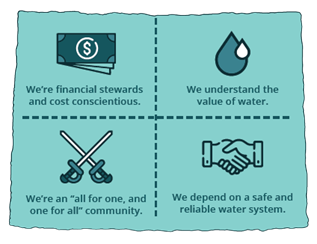Project 7 is the wholesale water treatment provider that supplies Montrose, Delta, Olathe, Tri-County, Menoken, and Chipeta with affordable and safe drinking water. These communities contract with Project 7 for treatment services instead of operating their own water treatment plants, allowing them to benefit from an economy of scale and enjoy region-wide water security.
Frequently Asked Questions
|
The goal of this effort is to strengthen the regional drinking water system. The Regional Water Supply Program and Ridgway Water Treatment Plant will add a second water source to the valley and serve all Project 7 members by increasing the security of our water supply. By directly accessing existing water rights in Ridgway Reservoir, we will build a more secure and reliable system that is resilient to wildfire, drought, and transmission interruptions in the Gunnison Tunnel.
|
Today, a single water supply source – the Gunnison River – and a single treatment facility provide all the drinking water supplied by Project 7 to the region’s municipalities and rural areas. This presents major risk factors to the Valley’s water system. A wildfire, pipeline or tunnel failure could cut off the drinking water that over 50,000 people and thousands of local businesses depend on. The most cost-effective and long-term solution is to develop a new drinking water source that reduces the risk of water supply interruptions for the region.
Our communities need to be prepared for emergencies and water supply interruptions so we can effectively manage water supply and sustain our economy in difficult times. This effort is designed to help our region reduce risk for supply interruptions due to tunnel failure, drought, wildfire, and other circumstances. It will also allow Project 7 and its members to directly access existing Uncompahgre River water rights instead of relying on trades and exchanges.
The ultimate cost is dependent on a variety of factors to be determined during design. The Project 7 team is working diligently to evaluate cost-saving alternatives that include phased buildout capacities, alternative raw water conveyance methods, and treatment options to maximize the use of existing infrastructure. Detailed cost projections will be developed and shared with the community at key milestones in the project development process.
This effort will be funded in part by increasing the price that Project 7 members pay for treatment services. This cost will be shared equally throughout the valley and supplemented by aggressively seeking supplemental state and federal funds. It is anticipated that the price Project 7 charges for treating water (a.k.a. wholesale water rates) will increase to provide the local match required for outside grant funding and account for inflation. Each of Project 7’s member entities are public water systems responsible for purchasing services from P7 and safely conveying drinking water to the customer. Each member entity will decide how much of this cost is passed on to their communities via customer rate increases, which will vary.
Providing safe drinking water from Project 7 is only a portion of overall operating expenses for your water provider. That is because each member must also maintain a local distribution system and ensure compliance with state and federal regulations governing public water systems. Based on available budget information, wholesale water supply may account for 20% to 30% of annual expenses for some entities. This means that a 100% increase in Project 7 wholesale rates corresponds to a 20% to 30% increase in your water provider’s operating expenses, which will inevitably mean reasonable increases in water rates – at the discretion of your provider – to strengthen the regional system we all rely on.
Currently, the average monthly water rate for the combined Project 7 members is among the least expensive in the state (32nd percentile based on a single-family equivalent (SFE) of 8,000 gallons). Predicting how our future rates will compare is more difficult, because our peer systems will also raise their rates over the next 10 years to fund their own infrastructure investments. The most recent peer system rate comparison is available in the Spring 2023 Governing Bodies Presentation (slides 37 and 38).
- Return on Investment: Project 7 provides rate stability, predictability, and an economy of scale across the region.
- Cost-Effective: This project will leverage smart construction phasing, flexible designs, and innovative financing options to optimize our investment.
- Long-Term: Investments must complement the long-term plan because, “twenty years from now this will be a bump in the road, but a water shortage is remembered forever.”
- Results: Project 7 and its members wish to see continued and incremental progress based on a solid implementation plan for design, construction, and financing.

